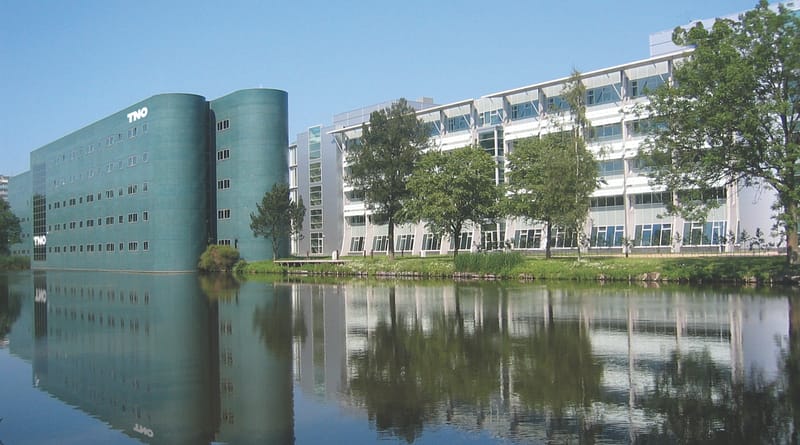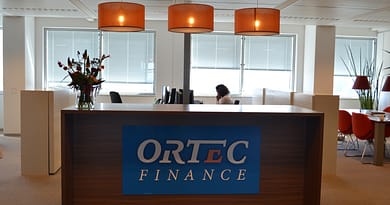A Unique Company with an Open Business Culture
When Daniëlle and I arrive at the TNO facility in Delft, we are welcomed by Iris Blankers, one of the three econometricians we are going to interview. Iris studied Econometrics & Operations Research in Tilburg, and since January of this year, she works for TNO. After we are offered some coffee, Iris explains that there is an open working environment at most departments of TNO. This means that no one has a standard working place, but depending on your tasks for that day you choose where you want to sit. When we arrive at one of the smaller rooms, Werner Liebregts joins us for the interview. Werner also studied in Tilburg, but he first finished a master program in economics, and after a pre-master he finished the master program Econometrics and Mathematical Economics.We start our interview with some general questions about TNO. TNO stands for ‘Nederlandse Organisatie voor Toegepast Natuurwetenschappelijk Onderzoek’ (English: Dutch Organization for Applied Scientific Research). But nowadays it does much more than that. The field in which TNO operates is best defined as research, in the broadest sense of the word. Currently TNO has 24 offices in the Netherlands, one in Brussels, and one in Qatar. There are more than 3800 employees working for TNO, of which 58 are active outside the Netherlands. Every location is divided in departments and every department has its own area of expertise. One of the things that Iris and Werner state right away is that TNO is a very open organization. You are not bound to one department, not even to one location. Besides that, there are no strict working hours, so there is a lot of freedom to choose when and where you want to work. Moreover, there is a lot of interaction between the different locations of TNO, and also between the departments of every building. Therefore it is fairly easy to switch your working environment and you are practically able to choose your own work. You can decide by yourself if you want to accept certain research projects, or if you would rather spend your time on another project.
At TNO employees work within a matrix organization. There are three main expertise centres: ‘Technical Sciences’, ‘Behavioral and Societal Sciences’ and lastly ‘Earth, Environmental and Life Sciences’. Every department, officially called expertise group, falls within one of these expertise centres. Overlapping these three expertise centres, there are seven themes. Almost all themes come back within every category, but the way in which they do differs per department. The themes are the face to the outside world. They handle the contact with the external clients, and they ask the departments to do the research.
A few minutes after we have started, Layla Lebesque joins us for the interview. Layla follows a traineeship at TNO, which we will explain in more detail later. Layla studied in Maastricht, and finished her master program Mathematical Economics in 2011. After finishing her master program, she traveled in South America for six months.
Working for TNO
For juniors, there are two ways to start working for TNO: either as a Trainee, or within the Talent Development Program (TDP). Within the TDP you start at one department, and a specific background is required. Because Werner applied for his job directly, as response to a job advertisement, he follows the TDP program. The traineeship program is the other way to get into TNO, and it is the one that Layla is in. This program gives you the opportunity to use your background in different parts of the TNO organization. This way you get a broad view of the different departments at TNO.
The traineeship lasts for two years, during which you work at three different departments. You work at each department for eight months, in this way you learn what kind of working place suits you best. The first department is mostly chosen for you, but for the other two departments you have to actively search yourself. You need to talk with the managers of other departments to find out what you think that would suit your skill set.
Besides the time you spend working at the departments, which is about 70% of your time, you also spend 30% of your time on trainee activities. Amongst these activities are some individual trainings that are aimed at personal development. Every employee of TNO has these trainings, also the ones in the TDP program. So TNO invests a lot in the personal growth of their employees. As a trainee you also work with other trainees on a trainee project. For this you work with around five trainees, for an internal client, on an assignment that links to the strategy of TNO.
Because TNO is such a diverse company, there are trainees varying from chemists, to psychologists, to econometricians. Although there are not many econometricians working at TNO, there is a high demand for them. As an econometrician, you are free to choose how to use your econometric background. While Werner uses his background to give a fresh look at how data should be interpreted, Iris decided not to do too much with the statistical background of econometrics, and instead decided to focus on other aspects. At TNO you are free to choose this for yourself.
All three of the interviewees, whether trainee or in the TDP program, have a lot of room to make their own decisions in their work. It is even possible to come up with your own ideas and conduct research about them. An example of this is the Knowledge Investment Program. These projects are not meant for a specific client, but are internal projects aimed at developing knowledge.
TNO is a project organization; employees work on different projects at the same time. This ensures a lot of variety in your work. To a certain extent, you are free to choose which projects you want to work on.
The Role of TNO
TNO is not a part of the government, contrary to what a lot of people think. But there is a law which states that a company like TNO must exist in the Netherlands, in order to keep the level of knowledge up-to-date. TNO does get support from the government, but TNO conducts more and more market research, in cooporation with other companies. Because of this, they become less dependent on the government. A part of the research, however, has to be done without support from companies. This is mostly research in which companies are not yet interested, because it is not yet economically feasible, such as the Knowledge Investment Projects.
TNO has the task of supporting the market, but they need to watch out not to disrupt it with their research. As soon as TNO sees that one of their research projects starts to disrupt the market, they stop it or sell it. They are not allowed to compete with other companies, because the subsidy they get from the government may result in unfair competition.
Some Final Thoughts
The last question we ask the econometricians is whether they have any advice for our readers. First of all, we are advised to do something besides your study. That can be all kinds of things such as joining a student/study organization, sporting, or even participating in local politics, as long as you do something you love besides studying. This is a great boost for your personal development. Secondly, Layla states that it is important to visit companies yourself, for example with an internship during your study. In this way you get to know a company much better since you are actually there, instead of just listening to their presentations. And with these final words in our thoughts, Daniëlle and I head back home. We would like to thank all interviewees for their time.
Text by: Tim Gijsbers




